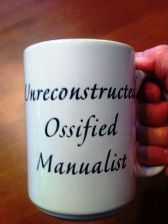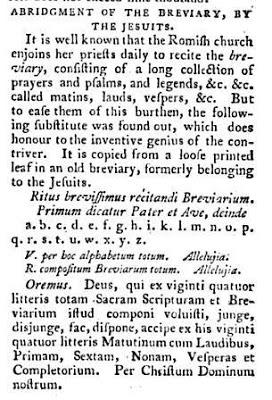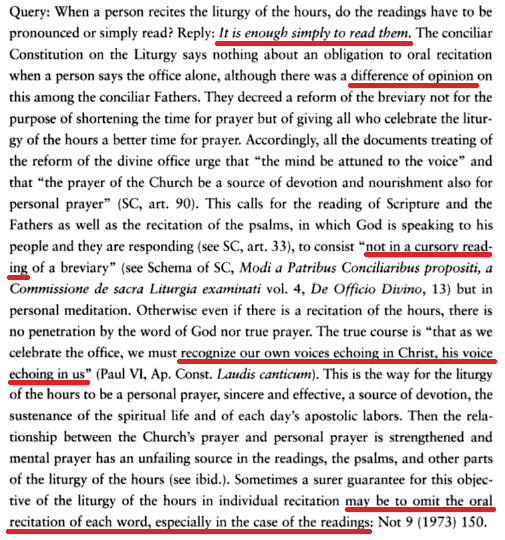 From a reader…
From a reader…
QUAERITUR:
I have seen a tendency for people who have a duty to say the Office attempt to satisfy their obligation without mouthing the words with air passing through the lips. Has the liturgical law changed? I’m pressure sure [I’m pretty sure that that’s “pretty sure”] the older manuals like Prummer [insert reverent head bow here] said each syllable must be uttered for the perfect satisfaction of the obligation.
So the question is must the Office be performed as vocal prayer rather than interior mental prayer?
For the perfect satisfaction of the obligation?
 We are Unreconstructed Ossified Manualists. Let’s look it up.
We are Unreconstructed Ossified Manualists. Let’s look it up.
Let me just say that most diocesan priests and bishops – 99.99% I would guess – might be a little horrified to read the whole section De attentione et devotione in recitandis Horis in…
Sabbetti-Barrett (see my note at the very end of the post):
Pronuntiatio debet esse vocalis, integra et continuata. Et 1°. quidem debet esse vocalis, nam Officum recitari debet voce, et quidem distincta; non autem sufficit, ut sola mente legatur, aut tantum oculis percurratur; nec satis est, se recitetur gutture vel intra dentes, aut syncopando, linguave titubante abbreviando; nam id quod praecipitur est oratio propriae vocalis; oratio autem non censetur proprie vocalis, nisi voce distincta fiat;2°. debet esse integra, ad integritatem autem pertinent Pater, Ave Credo in principio et fine Horarum, prout in Rubricis adnotatur, non autem orationes Aperi Domine et Sacrosanctae, quae solum ex consilio recitantur; 3°. debet esse continuata; se proinde quaecumque notabilis interruptio intra unam Horam, si absque ulla causa fiat, culpa non caret; sed peccatum veniale non excidit. Cf. S. Alphons. n. 166.
So, yes, the Office must be recited, pronounced, since it is vocal prayer (cf. CCC 2700 ff.).
Also,
580 QUAER. 1°. An recitans Officium debeat se audire, ut possit dici vocaliter orare?
Resp. Neg., quia oratio vocalis dicitur per oppositionem ad mentalem, et vere habetur quoties verba vere pronuntiantur, utut a nemine audiantur; ac proinde sufficit, si recitans conscius sibi sit se verba pronuntiare. – Cf. S. Alphons. n. 163.
Deeply drilling Prümmer (1953) says (vol. 2, #370): “Ad plene satisfaciendum praecepto ecclesiastico Officium divinum recitari debet: 1. debito ordine, loco, situ, tempore; 2. integre; 3. continue; 4. vocaliter; 5. cum attentione et intentione.”
Notice that “plene“!
In the explanation in #375 he says:
“Immo est consuetudo haud laudabilis ita proferendi aut potius sibilandi verba Officii in recitatione privata, ut circumstantes inde molestiam patiantur. Clericus mentaliter tantum Officium legens aut solis oculis percurrens non satisfacit suae obligationi; saltem si non habet speciale privilegium.”
If you don’t say your Office vocally, and just do it mentally, according to Prümmer you don’t fulfill your obligation. HOWEVER, he goes on to say that Leo X (of happy memory) gave the Friars Minor this privilege. And also in #376,
“Propter auctoritatem S. Alphonsi, cuius sententias quilibet confessarius in praxi sequi potest, nisi Curia Romana expresse aliud statuerit, non auderem quidem peccati mortalis reum declarare clericum regularem, qui totum Officium mentaliter tantum dixerit, sed haud pauci auctores docent, privilegium istud a Leone X concessum hodie iam non existere.”
Something in the back of my mind tells me that that privilege was rescinded by Gregory V.
HENCE: Recitation of the Office should be aloud, since it is official and mainly vocal prayer. This is why of yore and even now priests move their lips when saying their Office.
I guess it could be possible to fulfill your obligation mentally, but only with permission from proper authority. I imagine that that could be the diocesan bishop for diocesan priests. After all, Sacrosanctum Concilium 101 says that the “ordinary” can give clerics permission to use the vernacular for the office. More HERE. One might argue that while Latin may not be of the essence of the Office, vocal prayer is.
However, even when you don’t read aloud, there is a measure of subvocalization going on when reading.
That said, I am of the opinion that a priest imperfectly fulfills his obligation even when not moving his lips, only reading silently. I don’t know if that is a venial sin or not. I suppose a great deal depends on the training the priest had about the nature of the Office. I suspect that none of this is explained in seminaries, even from the point of view of historical interest.
In the instruction for the Liturgy of the Hours there is an explanation that biographical notes about saints are not for reading aloud. That implies that the rest is read aloud. Also, there is a paragraph at 103 says that “even when a psalm is recited and not sung or is said silently in private, its musical character should govern its use”. But that seems to be about Psalms in general rather in about their specific recitation in the Office.
It seems to be that even in the lax days of the Liturgy of the Hours, the obligation of true vocal recitation remains as it did before.
 If that is the case, we are in serious trouble as a Church and so is the whole world: the official prayer of the Church which clerics and religious should be offering for the sake of the whole People of God … isn’t being offered in a satisfactory way.
If that is the case, we are in serious trouble as a Church and so is the whole world: the official prayer of the Church which clerics and religious should be offering for the sake of the whole People of God … isn’t being offered in a satisfactory way.
See my SAVE THE LITURGY – SAVE THE WORLD Manifesto.
And then there’s this!

When I read these manuals, especially the sections that pertain to clerical life, liturgy, etc., I am always left simultaneously edified and humiliated.
I am edified at the amazing ideals which are proposed according to law and reason.
I am humiliated in that in many respects I don’t come up to scratch.
I must rededicate myself – confess those faults which I think may be mortal – and then amend and improve.
So… I am now going to back away from this question and quietly, indeed silently and not even moving my lips, go back to my To Do List.
The moderation queue is ON (especially for those who want to provide translations of the Latin – which would be a great service to non-Latin reading bishops and priests out there). If sound, I’ll integrate them into the post.
UPDATE: Not satisfied… I found also this.
Sacred Congregation for Divine Worship Note Liturgiae Horarum Interpretationes (Not 9 (1973) 150)
Query: When a person recites the liturgy of the hours do the readings have to be pronounced or simply read?
Reply: It is enough to simply read them. The conciliar Constitution on the Liturgy says nothing about an obligation to oral recitation when a person says the office alone, although there was a difference of opinion on this among the conciliar Fathers. They decreed a reform of the breviary not for the purpose of shortening the time of prayer but of giving all who celebrate the liturgy of the hours a better time for prayer…Sometimes a surer guarantee for this objective of the liturgy of the hours in individual recitation may be to omit the oral recitation of each word, especially in the case of the readings.
Found on page 1098 of Documents on the Liturgy 1963-1979. Conciliar, Papal and Curial Texts. The Liturgical Press, 1982
With this explanation:

I find in this a contradiction, especially in light of the expression of Paul VI about Christ’s voice echoing in us.
This is such a different approach. It seems simply to sweep aside the characteristic liturgical prayer as vocal prayer. NB: A priest cannot simply think the words of consecration or the forms of the other sacraments.


































Would chanting it out loud count? While I’m a layman and not under any obligation to say the Office I do like to say the it in the manner the Church proscribes. I say the new Divine Office using a simple form of plain chant I learned whilst on retreat at a Trappist monastery. My parish priest also does this. Is this kosher?
Also, how “loud” does one have to say the Office for it to “count”.
[Much of this issue of volume is covered in the Latin I posted. Also, choral recitation is clearly acceptable. But the need to be attentive to what the other side is singing is important for the fulfillment of the obligation.]
Thank you Father for this post. Thank you for your humility in writing this. I found myself wincing already when you simply suggested we priests be prepared to wince – as I have failed greatly in these matters. Interestingly, as I reflect upon these words in relationship to my own practices, I have always found the Office more fruitful in those stretches when I have forced myself to audibly pray it (which unfortunately for me, in my best stretches over 18+ years, might have been for a week or two before I got lax and simply mentally prayed it again.)
The good news: I can begin today with Midafternoon Prayer! Thank you again for this call to greater integrity and responsibility in prayer! (I think I’ll be sharing this post with brother priests).
As one who longs to be a unreconstructed ossified manualist I long to read these manuals, but since my seminary formation did not include a rigorous education in the Heavenly Tongue – aka Latin – I am wondering if any of these manuals are available in English. Please advise.
It’s uncanny but the Gospel (Matthew 23:13-22) at Holy Mass this morning is so timely and speaks to this and so many troublesome questions with perfect clarity.
[Perfect clarity? No. It doesn’t… if you take seriously the virtue of religion. If I understand correctly what you seem to be saying, you think that wondering or worrying about vocal or mental recitation of the Office is like the awful things that Christ says the hypocrites do. If that’s so, then, gee, thanks a lot. We who say the Office, say it for the sake of the whole Church… for YOUR sake and benefit. A lot of really smart people have been dealing with questions like these for a long time. Over the centuries, the Powers That Be would certainly have connected the words of Christ about pharisees and hypocrites to details about recitation of the Office (our “duty… obligation”). Had Matthew 23 applied, as you suggest, then centuries ago there would have been a wholesale overhauling of the very notion of liturgical prayer. The recitation of the Office is not just a private act or devotion. This is actually a pretty important question, if you take seriously the virtue of religion and our vocations in and for the Church.]
I guess it could be possible to fulfill your obligation mentally, but only with permission from proper authority.
Our former priest was telling us of one of his visits to a monastery of monks and attended the Divine Office with them, which was fully chanted. He kept hearing someone whistling the chants, so afterwards he asked the Superior about it. It turned out there was a monk who was absolutely hopeless in terms of chanting, but he was particularly gifted in whistling, so he was given permission by the appropriate authority to fulfill his obligation via whistling it while reading the text in his head.
Would the more recent pronouncements affect the older Office, for priests (or laity) who recite it per SP’s provisions? Are the laity also required to recite it aloud? I usually use the older office, or the Byzantine office, (still with the Gregorian calendar, so the Sundays usually line up,) but usually in the sense of moving my mouth, not necessarily with air passing my lips, especially if I’m reciting sext during lunch at work. (IT leans super-far to the left, so…) For a laywoman with no canonical obligation to recite the Office, is the recitation without any merit if the words are not at least whispered?
What scrupulosity? o.o;;;
Since the Divine Office is a sacramental, it requires some external sign, so it seems reasonable that it must be recited. But the readings in the Office of Readings, say, to merely read them without pronouncing them, seems to parallel what would take place in a communal celebration where one would listen to said readings.
That one who prays doesn’t need to hear himself is also stated here in the Manuale Theologiae Moralis: Ludovicus Wouters C. SS. R. 1932: (which I purchased for a few dollars after it was tossed out from some monastic library in New York):
Quod ad substantiam praecepti (vocaliter recitandi) pertinet: sufficit autem verba propriis organis, id est lingua et labiis formasse: quo facto, necessario aliquis sonitus producitur; at non refert utrum necne recitans seipsum audiat. (S. Alf.)
Surgeworks has made a Divine Office app, which allows you to listen to the hours being read. I use this often during evening prayer, as my second shift job involves a lot of driving. Of course, during the Magnificant, I recite it along with the narrator as that is easily memorized. Does this fulfill the obligation to say the hours?
Fr. Gianfranco Ghirlanda, S.J., holds that oral recitation is not necessary to fulfill one’s obligation.
In dubiis, libertas.
Here’s my attempt at those translations, Father:
The proclamation [i.e. of the Office] must be vocal, complete, and continuous.
To the first point: It must indeed be vocal, for the Office ought to be recited by voice, and distinctly. It does not suffice to be read solely mentally, or to be scanned merely by the eyes. Nor is it enough that it be recited in the throat or teeth, or in a broken manner, or with the tongue faltering and abbreviating. For that which is prescribed is the prayer of one’s own voice: and prayer is not reckoned to be of one’s own voice unless it be done with a distinct voice.
To the second point: The Office must be whole, and the integrity of the Office includes the Pater, Ave, and Credo at the beginning and end of the Hours (as noted in the rubrics), but not the orations Aperi Domine and Sacrosanctae, which are recited solely by choice.
To the third point: The Office must be continuous. Hence any significant interruption in an Hour, if it be without some cause, is not free from fault: but it is not more than venial sin.
Cf. Alphonsus n. 166.
———
580: Question: Whether one reciting the Office must be able to hear himself, in order that he can be said to pray vocally?
Response: Negative. For “vocal” prayer is said as opposed to “mental”, and this is truly the case, whenever the words are truly pronounced, even if heard by no one. Hence it suffices, as long as one reciting is himself aware that the words themselves are pronounced. (Cf. S. Alphonsus n. 163.)
———
“Indeed, it is a habit not at all praiseworthy so to carry on or to whisper the words louder in private recitation, such that those nearby suffer irritation. A cleric merely reading the Office mentally or scanning it with only his eyes does not fulfill his obligation: at least, if he does not have a special privilege.”
——–
“Following the authority of S. Alphonsus, whose opinions any confessor can follow in practice (unless the Roman Curia expressly ordain otherwise), I should not be so bold as to declare guilty of mortal sin that cleric regular who should say the whole Office merely mentally; yet not a few authors teach that the privilege granted by Leo X no longer exists today.”
I’m still slogging through Father Bugnini’s book, Reform of the Liturgy 1948-1975, but immediately relevant to this discussion is the fact that he and many members of the Consilium advocated for the suppression of Prime. I don’t use the LOTH, but since eliminating one hour and reducing others was their goal, it seems only logical that they would encourage reading silently, rather than speaking aloud the various parts of the Office.
One wonders what Saint Ambrose would say. He had a certain celebrity and caused general amazement because he in private ‘read without moving his lips’. In his day most manuscripts were written ‘run on’ without spaces between the words, so pronunciation of the words in an aural way was generally the key to following the meaning of what was being read. It is a fair guess that the requirement of ‘mouthing the words’ outside of choir recital is a linear descendant of the problem of reading ‘run on’ manuscripts correctly. Since we do not generally have that ‘problem’ since the invention of printed books, it would seem logical that ‘proper glory to the Lord’ can be given in ‘private recitation’ of the breviary — and we can follow the example of the great Father of the Church, Saint Ambrose.
When my beloved and cantankerous grandmother died, I began praying the Liturgy of the Hours after reading the following account of St. Gertrude wherein she asked our Lord:
‘…why the Great Psalter was so acceptable to him and why it obtained such great relief for the souls, since the immense number of psalms which were recited and the long prayers after each caused more weariness than devotion. Our Lord replied: “The desire which I have for the deliverance of the souls makes it acceptable to Me; even a prince who has been obliged to imprison one of his nobles to whom he was much attached, and was compelled by his justice to refuse him pardon, would most thankfully avail himself of the intercession and satisfaction of others to release his friend, thus do I act toward those whom I have redeemed by My death and Precious Blood, rejoicing in the opportunity of releasing them from their pains and bringing them to eternal joys.” “But,” continued the Saint, “is the labor of those who recite this Psalter acceptable to Thee?” He replied: “My love renders it most agreeable to Me; and if a soul is released thereby, I accept it as if I had been Myself delivered from captivity, and I will assuredly reward this act at a fitting time according to the abundance of My mercy”. Then she inquired: “How many souls are released by these prayers?” He answered: “The number is proportioned to the zeal and fervor of those who pray them.” He added: “My love urges Me to release a great number of souls for the prayers of each religious.”
With that in mind, I would not only pray the Liturgy of the Hours aloud, I would sing them with great zeal.
Isn’t her forthrightness something? I think that’s the heavenly tongue, the angelic language: Truth. Perhaps it’s why saints can converse with Him so easily, they speak His language.
Dear JesusFreak84,
as laity aren’t obliged to recite the Divine Office at all, a fortiori they aren’t obliged to recite it allowed if they do.
(My personal experience, by the way, is that even if I would at least mouthe the rest, I intuitively turn to silent reading for the lessons, except for the Gospel incipit.)
Thank you for this post, Fr. Z. It has informed my praying of the Divine Office in a very beneficial way.
Pingback: FRIDAY CATHOLICA EDITION | Big Pulpit